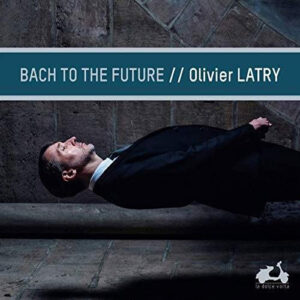This recording, “Bach to the Future”, made by the titular organist at Notre Dame, Olivier Latry, is the last to have been made on the church’s grand 1868 Cavaillé-Coll organ before disaster struck the Paris cathedral. Now it might be said that it’s easier to transcribe Bach’s cello suites for the marimba than to transport his organ works from baroque or neo-baroque instruments to this equivalent of a sacred Wurlitzer. After all, the grand romantic French instrument has about as much to do with Bach’s organs as a spit-roast with a microwave. One might even fear a travesty along the lines of Cameron Carpenter, who mangles all the Bach he touches–or worse, Jean Guillou. But firstly Latry is a supremely tasteful musician and, secondly, is aware of lurking dangers. He performs these “key works of Protestantism in one of the most emblematic centers of Catholicism” without smudging the polyphony that gives Bach its super-added quality, despite a whopping seven-second reverb at Notre Dame.
This starts impressively in the Ricercare á 6 from A Musical Offering that is spaced out in time and timbre to bring every voice to the fore with absolute clarity while never pretending that Cavaillé-Coll’s organ is a small instrument. On the other extreme, Latry goes full Fu Manchu-meets-Stokowski in the famous Toccata and Fugue in D minor. In the Fantasy and Fugue in G minor BWV 542 he aptly took to the Liszt transcription as a 19th century romantic stepping stone for the transfer to his instrument. Latry brings all these virtues together in the concluding great Passacaille BWV 582, which slowly swells from the lowest depths to grandest, blazing glory. It is at once fascinatingly true to Bach’s notes and reminiscent of the openings of Beethoven’s Ninth symphony or Wagner’s Rheingold. When it rises to full glory before the Fugue, the effect is one of breathtaking splendor.
Still, the subtle high points of this recital might just be the Chorale “Erbarm’ dich mein, o Herre Gott” BWV 721, which impresses with absolutely impeccable pacing, and the Chorale “Herzlich tut mich verlangen” BWV 727 where, with homogeneous registration, Latry exudes a divine sense of calm. It is a fitting tribute to his predecessor Louis Vierne, who had also played it on that organ in 1929 (the clip can be readily found on YouTube).
The luxurious presentation, as always on La Dolce Volta, suits the content (except for incorrectly listing the BWV number for the Orgelbüchlein’s “In dir ist Freude” as 617 instead of 615). Miraculously, the 8000-pipe instrument survived the blaze of Notre Dame de Paris, although restoration, repair, and reconstruction of the instrument will likely take decades. Until we hear the instrument in all its sumptuous glory again, it’s a boon to have recordings to turn to, like this one.
































